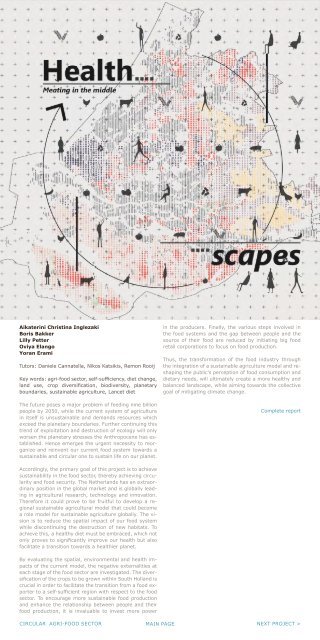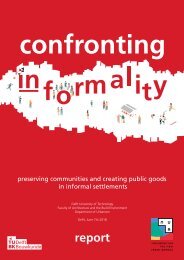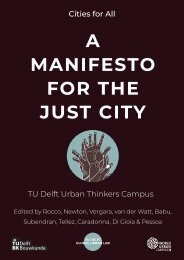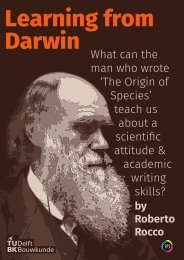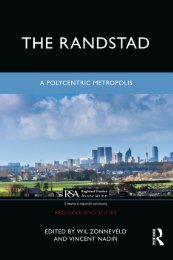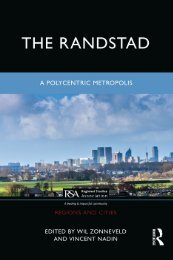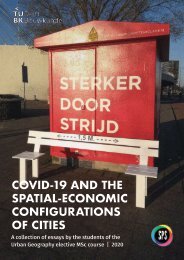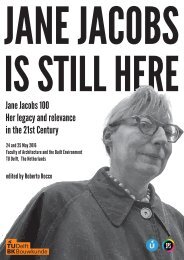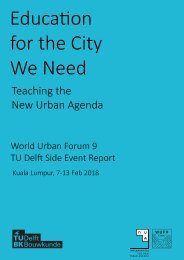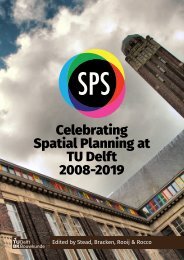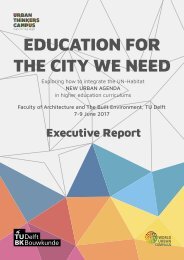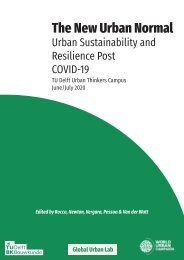Circular Southern Holland, an Online Exhibition
Online exhibition R&D studio Spatial Strategies for the Global Metropolis (AR2U086 & AR2U088), part of MSc Urbanism, Delft University of Technology, organised by Verena Balz and Qu Lei. We proudly present results of the Research & Design studio Spatial Strategies for the Global Metropolis, part of the MSc Architecture, Urbanism and Building Sciences/Track Urbanism programme at Delft University of Technology in an online exhibition. The thematic focus of the 2020-2021 round of the studio was informed by an ambitious policy agenda that the Province of South Holland has set out: aligned with objectives of the Dutch national government, it intends to host a 100% circular economy by 2050. 19 groups of students have analysed spatial and institutional development in Southern Holland and have designed visions and development strategies that lead towards a circular construction- and demolition sector, a circular agri-food sector, and a circular bio-based chemical sector in the region. In conjunction the projects presented in this exhibition explore the spatiality of a circular economy and seek to inspire spatial planning in this way. In the exhibition each student groups’ project is represented by an executive summary, which gives key information on the project and main recommendations on how to foster a circular economy in Southern Holland, and the title page of the group’s project report. Visitors who want to gain a deeper insight into projects can access the actual report in the TU Delft education repository.
Online exhibition R&D studio Spatial Strategies for the Global Metropolis (AR2U086 & AR2U088), part of MSc Urbanism, Delft University of Technology, organised by Verena Balz and Qu Lei.
We proudly present results of the Research & Design studio Spatial Strategies for the Global Metropolis, part of the MSc Architecture, Urbanism and Building Sciences/Track Urbanism programme at Delft University of Technology in an online exhibition.
The thematic focus of the 2020-2021 round of the studio was informed by an ambitious policy agenda that the Province of South Holland has set out: aligned with objectives of the Dutch national government, it intends to host a 100% circular economy by 2050. 19 groups of students have analysed spatial and institutional development in Southern Holland and have designed visions and development strategies that lead towards a circular construction- and demolition sector, a circular agri-food sector, and a circular bio-based chemical sector in the region. In conjunction the projects presented in this exhibition explore the spatiality of a circular economy and seek to inspire spatial planning in this way.
In the exhibition each student groups’ project is represented by an executive summary, which gives key information on the project and main recommendations on how to foster a circular economy in Southern Holland, and the title page of the group’s project report. Visitors who want to gain a deeper insight into projects can access the actual report in the TU Delft education repository.
You also want an ePaper? Increase the reach of your titles
YUMPU automatically turns print PDFs into web optimized ePapers that Google loves.
Aikaterini Christina Inglezaki<br />
Boris Bakker<br />
Lilly Petter<br />
Oviya El<strong>an</strong>go<br />
Yor<strong>an</strong> Erami<br />
Tutors: D<strong>an</strong>iele C<strong>an</strong>natella, Nikos Katsikis, Remon Rooij<br />
Key words: agri-food sector, self-sufficiency, diet ch<strong>an</strong>ge,<br />
l<strong>an</strong>d use, crop diversification, biodiversity, pl<strong>an</strong>etary<br />
boundaries, sustainable agriculture, L<strong>an</strong>cet diet<br />
The future poses a major problem of feeding nine billion<br />
people by 2050, while the current system of agriculture<br />
in itself is unsustainable <strong>an</strong>d dem<strong>an</strong>ds resources which<br />
exceed the pl<strong>an</strong>etary boundaries. Further continuing this<br />
trend of exploitation <strong>an</strong>d destruction of ecology will only<br />
worsen the pl<strong>an</strong>etary stresses the Anthropocene has established.<br />
Hence emerges the urgent necessity to reorg<strong>an</strong>ize<br />
<strong>an</strong>d reinvent our current food system towards a<br />
sustainable <strong>an</strong>d circular one to sustain life on our pl<strong>an</strong>et.<br />
in the producers. Finally, the various steps involved in<br />
the food systems <strong>an</strong>d the gap between people <strong>an</strong>d the<br />
source of their food are reduced by initiating big food<br />
retail corporations to focus on food production.<br />
Thus, the tr<strong>an</strong>sformation of the food industry through<br />
the integration of a sustainable agriculture model <strong>an</strong>d reshaping<br />
the public’s perception of food consumption <strong>an</strong>d<br />
dietary needs, will ultimately create a more healthy <strong>an</strong>d<br />
bal<strong>an</strong>ced l<strong>an</strong>dscape, while aiming towards the collective<br />
goal of mitigating climate ch<strong>an</strong>ge.<br />
Complete report<br />
Accordingly, the primary goal of this project is to achieve<br />
sustainability in the food sector, thereby achieving circularity<br />
<strong>an</strong>d food security. The Netherl<strong>an</strong>ds has <strong>an</strong> extraordinary<br />
position in the global market <strong>an</strong>d is globally leading<br />
in agricultural research, technology <strong>an</strong>d innovation.<br />
Therefore it could prove to be fruitful to develop a regional<br />
sustainable agricultural model that could become<br />
a role model for sustainable agriculture globally. The vision<br />
is to reduce the spatial impact of our food system<br />
while discontinuing the destruction of new habitats. To<br />
achieve this, a healthy diet must be embraced, which not<br />
only proves to signific<strong>an</strong>tly improve our health but also<br />
facilitate a tr<strong>an</strong>sition towards a healthier pl<strong>an</strong>et.<br />
By evaluating the spatial, environmental <strong>an</strong>d health impacts<br />
of the current model, the negative externalities at<br />
each stage of the food sector are investigated. The diversification<br />
of the crops to be grown within South <strong>Holl<strong>an</strong>d</strong> is<br />
crucial in order to facilitate the tr<strong>an</strong>sition from a food exporter<br />
to a self-sufficient region with respect to the food<br />
sector. To encourage more sustainable food production<br />
<strong>an</strong>d enh<strong>an</strong>ce the relationship between people <strong>an</strong>d their<br />
food production, it is invaluable to invest more power<br />
CIRCULAR AGRI-FOOD SECTOR<br />
MAIN PAGE


